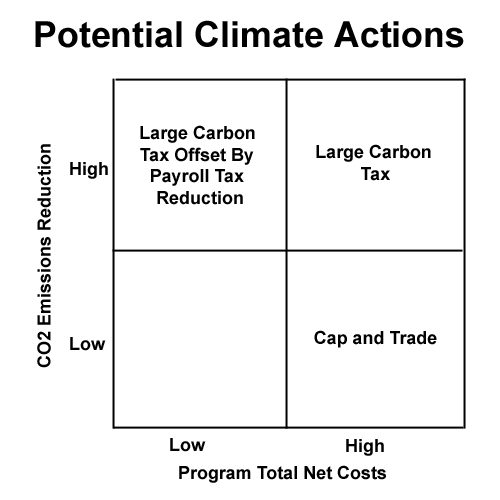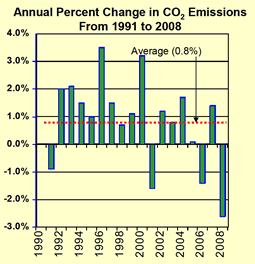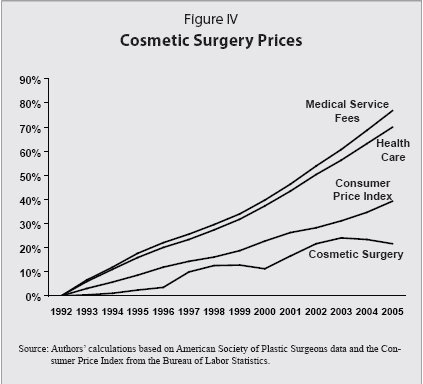I was going to respond to this goofy post on sustainability, but it would just be wasted time for this audience. I think most of you can spot the errors and non sequiturs. The heart of the problem is that the folks discussing "sustainability" have far more faith in the goodwill of people who deal with them through force (ie the government) than the folks who deal with them only via mutual consent (e.g. private enterprises).
I have never understood this attitude -- sure, the private guy on the other side of my transaction may be ridiculously wealthy, but he got that way only by being able to provide a service people are willing to buy of their own free will at a price that actually covers his costs**. No one ever volunteers to consume government services unless they are 1) forced to do so (as in public schools or a government supported monopoly) or 2) the service is heavily subsidized (meaning it doesn't not cover its costs).
Which led me to my definition of sustainability, which I think is particularly important in this time of absurdly skyrocketing government spending. Sustainability in my world means being able to supply a product or service that people are willing to buy of their own free will for the price I specify or that we negotiate, without any sort of coercion. And that this price charged covers not only my costs, but covers the capital costs of continuing to improve my offering in order to fend off potential competitors. And that this price further yields me a profit which pays me for my effort and gives me the incentive to keep providing this product or service.
In a free society, the ultimate measure of sustainability is profits. Profits are what make the division of labor possible, which in turn is the only approach we have ever found to living above a subsistence level. Without profits, activity beyond subsistence only occurs through coercion at the point of a gun. If an activity does not yield us surplus, does not reward us for our time spent, then we only pursue it if our rulers use force to make us do so.
iPods and Dell computers and Big Macs are sustainable. Government health care and cash for clunkers and the Post Office and Amtrak and about everything run by the State of California are not -- except when the government uses its power of force to grab the money it needs to close their budget gap or restrict individual choices or both. The Post Office is a great example -- the government uses force to take money via taxes from citizens to cover its operating losses, which the Post Office incurs even though the US has used force to prevent anyone from competing with its first class mail business (particularly the most profitable segment, intracity mail). And still, I might add, the Post Office is going bankrupt.
Look at Exxon vs. Amtrak. One runs for profit, and in fact gets excoriated for its profits, while the other is run by the government and is lauded for its beneficence. Which has proven the most sustainable?
And private enterprise has checks on their behavior that don't exist for monopoly government offerings. When private businesses screw up, or become senescent, or even corrupt, and fail to cover their costs, they are supposed to go bankrupt. For all the public handwringing about Enron being a bad example for capitalism, it was in fact a victory for capitalism -- an unsound, possibly corrupt, business died. Unsustainable business models, whether they be banks making nothing down mortgages or car companies producing bad cars, fail -- in fact, they are supposed to fail -- and resources are diverted to sustainable companies and businesses. Except when .... you guessed it .... the government intervenes to prevent this from happening by bailing out bankers and manufacturers alike because those companies are owned by or employ people who helped get the president elected.
This renewal never happens in government. We still have Amtrak, despite nearly 40 years of losses. We still struggle with the post office and the DMV. Heck, we still have state alcohol boards fingerprinting bar owners and running FBI checks on them to make sure we are not Al Capone, a problem that went away with the end of prohibition 3 generations ago.
Postscript: A part of the linked post is also a plea by two progressives for more protectionism. Clearly, these two folks don't agree with the majority economic opinion that protectionism is bad for all nations. But let's accept their premise for a moment. Let's assume, as they do, that trade is a mercantilist zero sum and that protectionism would net boost our economy. They are essentially advocating that the US, the wealthiest country on Earth, protect its workers to the detriment of poorer workers around the world. Is this really the progressive position?
Postscript #2: A good question I have been using for people lately who show great confidence in the government's ability to solve problems through coercion: "Imagine what powers you want to give the government. Now, imagine your political opponents in the _____ Party wielding those powers. Are you still happy? If not, what are you counting on? Point to the period in history where the same party held the presidency for 30 or forty years straight." This question works well because almost everyone who favors giving coercive power to the government imagines only themselves or their allies wielding this power.
** Footnote: OK, the guy in private enterprise may also have gotten rich from rent-seeking and government favoritism, but is that a failure of free enterprise or government? I would normally have said this was a rhetorical question -- clearly, to me at least, rent seeking is the result of a system that gives government employees power over individual decisions. In a country of strong personal liberties and limited government, rent-seeking is much much harder. But my liberal mother-in-law is totally convinced that rent-seeking is not the fault either of the structure of the government or the individual occupants of government but totally the fault of private businesses, and that only more regulation will stop it.



